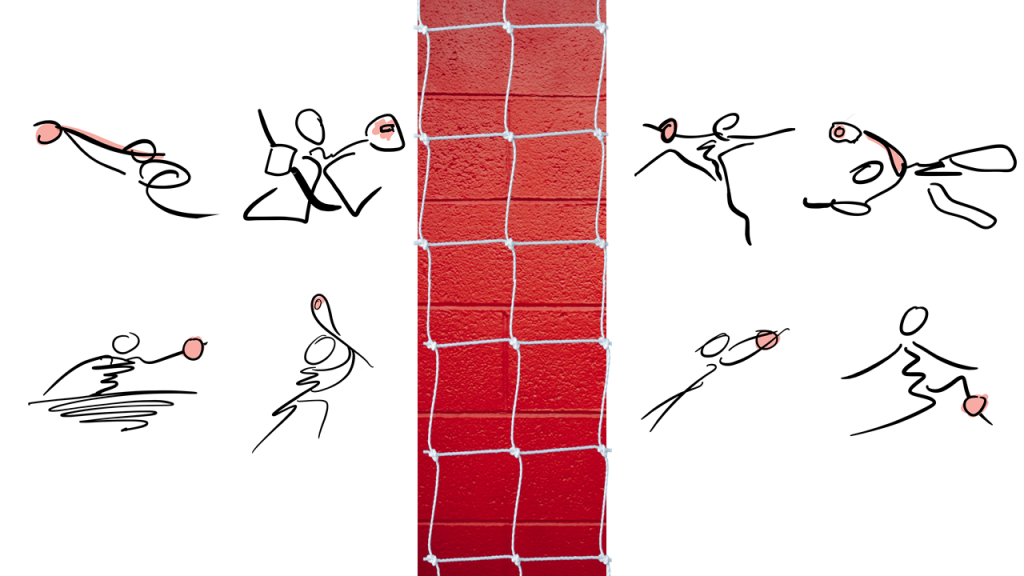Author: Tomaz Lasic

The key question of the ‘The Love of Goalkeeping’ book is ‘what is common to goalkeepers across sports?’ The book itself describes how this question came about as I started playing, coaching, thinking outside the boundaries of my own ‘native’ sport of water polo.
Now, that may sound nice and interesting but really – just why would a goalkeeper or their coach want to look beyond their sport? There surely is too much information and probably not enough time to look and consider everything in their own sport, let alone look at somewhere else… Well, there are a few good reasons why goalkeepers and their coaches would be wise to invest a little bit of their valuable resources in connecting across sports when it comes to goalkeeping.
Challenges and opportunities
As the book illustrates amply, goalkeepers and their coaches face many similar challenges and opportunities. This means there are also many different ways of dealing with them. Happy with the way you deal with these now? Great, good for you. But … remember that you are dealing with human beings and dynamic environments of sport where things can and do change, sometimes quite fast. New club? New team members, personalities, administrators, competition, opponents? New injuries? New expectations and appetites? New equipment? Change of rules? Endless list …
For example, just a few days ago I talked to a handball coach and an ex-water polo goalkeeper and in both conversations we talked about how ‘some days the ball looked like a golf ball and was unstoppable and sometimes seemed like a beach ball and no one could score against’. We talked about getting goalkeepers in the focused state of ‘flow’ where things seem effortless and how that could be the next ‘mental edge’. The sport really didn’t matter.
Similarly, a football coach told me of a team they played against whose strategy was to regularly ‘waste’ their first attack or two within minutes of starting the game. They launched one or two quite improbable-to-score shots as a message to the goalkeeper – ‘watch out, we’re out to get you’. If the goalkeeper saved it – not much was lost but if even one of the shots turned to be a goal (and sometimes it did!) it was incredibly demoralising for the goalkeeper to start the game with. And then I remembered years ago a champion Italian water polo team using the identical strategy against me! A wisened-up goalie knows this sort of threat exists and how to deal with it. What sport? Does it matter? Want more examples? Well, there is ‘The Love of Goalkeeping’ book to read…
New edge or spicing things up
So, it could be searching for the new edge and developing goalkeeping intelligence, battling similar demons or sometimes just to energise what can sometimes feel like a drudgery of goalkeeping in a particular sport – sharing experiences across sports can be incredibly rewarding. I remember well spicing goalie workouts for the male and female national water polo team with warm up and reaction drills used by football goalkeepers (you don’t have to look far – all you need is YouTube and a little imagination…). Both groups really liked them while certainly not frittering away precious prep time on something that wasn’t relevant to them.
Of course you would not replace all you know in your own sport with something from another. Looking and connecting outside your own sport might make you realise how much you DO know about your sport but also show the gaps you may have not considered. Importantly, looking to learn outside the boundaries of one’s own sport also builds the culture of learning and adaptation to challenges. The saying ‘it is not the strongest of the species that survives but the most adaptable’ may be some kind of crude cross between Taoism of Sun Tzu and Charles Darwin (no, neither of these two famous names said it) … but it has a point. The dynamic environment of sport requires us to stick our head up sometimes and look around. Sometimes this is a sheer necessity as no similar cases, changes or challenges have existed in our sport – but have in others.
Talking honestly and openly
Lastly, when we connect across sports we can often speak more openly and honestly and in return listen more thoughtfully too. This is because egos are less likely to be bruised or pumped and/or strategic competitive advantages within the same sport are less likely to be divulged. A hockey coach, water polo coach and a football coach don’t have to impress or intimidate each other with their knowledge or skill as they may feel so within their own sport. They can offer more of that honest, ‘naive listening’ and genuine curiosity in the spirit of sharing. They can sometimes force the expert in one sport to break things down in a way that improves the expert’s own understanding and explaining things within their own sport (“if you can’t explain something complex simply you probably don’t understand it well yourself”). And more, a lot of it refreshing and invigorating…
Imagine a science teacher saying it is a waste of their time to explain their teaching and see how their colleagues teach, motivate and deal with students in maths, languages, design and so on. Yeah, thought so.
So, where are you going to look, who are you going to connect with next?
Tomaz Lasic is the author of the book ‘The Love of Goalkeeping: Many Sports, One Love’
